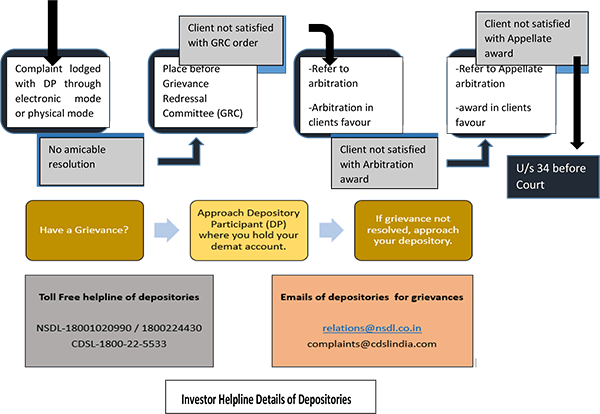The market works smoothly because many corporate entities work in collaboration with each other.
Whether you are buying or selling equity shares, market intermediaries work seamlessly together to ensure your transactions run smoothly without any glitches, right from the moment you log in to your trading terminal (to buy/ sell shares) to the moment these shares reach your DEMAT account.
Market intermediaries are individuals or organizations that help facilitate the buying and selling of financial instruments, such as stocks, bonds, and mutual funds, in financial markets like the stock market.
In simpler words, market intermediaries are the people or companies that help others buy and sell securities or assets in a financial market like the stock market. They play an important role in making sure that the buying and selling process goes smoothly.
For example: Imagine that you want to buy a toy from a store, but the store is very far away from your house. You could ask a friend who lives near the store to buy the toy for you and bring it back to you.
In this case, your friend is acting as a market intermediary, helping you buy the toy even though you can’t go to the store yourself.
Similarly, market intermediaries in financial markets help people buy and sell stocks, bonds, and other financial products. Moreover, they make sure that the transactions are done correctly and that everyone gets what they’re supposed to get timely.
Without market intermediaries, it would be much harder for people to participate in financial markets. Basically, they play an important role in the functioning of financial markets and help to promote economic growth and stability.
Market intermediaries are the heroes behind the screens, who quietly play their roles while complying with the strict SEBI rules all the time.
Types of Market Intermediaries
There are several market intermediaries in the Indian stock market that facilitate trading and investing in financial instruments such as stocks, bonds, and derivatives.
1. Stockbrokers
They are intermediaries who execute trades on behalf of their clients. They act as a link between the investor and the stock exchange. They can be full-service brokers or discount brokers.
Full-service brokers provide a range of services like research, advice, and portfolio management. Discount brokers offer a no-frills service and charge lower commissions. Example: MyGainn, Zerodha, ICICI Direct, HDFC Securities.
The primary services that are provided by the stock broker are:
1. Providing access to the financial markets and facilitating you to transact.
2. Provide leverage to trade.
3. Provide support in terms of trade, educate you on markets & help you resolve queries.
4. Issue contractual notes for your transactions on a daily basis. It is a written note that details the transactions carried by you during the day.
5. Assist in transferring the funds between your bank & trading account.
6. Provide access to various important reports about your account.
Brokers charge fees for the services they provide, also known as ‘brokerage charges’ or just brokerage. These fees vary, and it’s up to you to find a broker that you think balances the fees charged with the services provided.
2. Depository Participants
They are intermediaries who provide dematerialization of shares and other securities. They hold securities in electronic form and maintain records of transactions.
They offer services like account opening, transfer of securities, and settlement of trades. Currently, only two depositaries offer services of DEMAT accounts including NSDL, and CDSL and both operate under strict regulations of SEBI.
See, one cannot directly walk inside the NSE’s (National Stock Exchange) office to open a trading account. Similarly, the depository (NSDL or CDSL) will not open a Demat account for you.
Instead, you have to open a demat account with a Depository Participant (DP). It will help you in setting up a DEMAT account with the Depository. Further, a Depository Participant acts as an intermediary between you and the Depository.
It is important to note that a DP is also governed under the SEBI regulations. MyGainn is a depositary participant (DP) of Central Depository Services (India) Limited (CDSL).
3. Clearing Corporations
They are intermediaries who ensure the settlement of trades. They act as a counterparty to all trades and guarantee the settlement of transactions. They also manage the risk associated with trades.
Let us give you a very simple example that even a child will understand: Imagine you’re playing a game with your friends where you trade different kinds of stickers.
You might have some stickers that your friend wants, and your friend might have some stickers that you want. So you trade your stickers with each other.
But sometimes, it’s hard to keep track of who owes what stickers to whom. Maybe you gave your friend some stickers, but they haven’t given you any stickers back yet. Or maybe your friend gave you some stickers, but you forgot to give them any stickers in return.
This is where a clearing corporation comes in. It’s like a grown-up who helps make sure that everyone gets the stickers they’re owed, and no one gets cheated.
So let’s say that you and your friend are playing the sticker trading game, but this time you have a grown-up who’s helping out. Whenever you make a trade with your friend, you tell the grown-up what stickers you’re giving and what stickers you’re receiving. The grown-up writes down all the trades and keeps track of who owes what stickers to whom.
At the end of the game, the grown-up checks all the trades to make sure that everyone got the stickers they were supposed to. If someone doesn’t get the right stickers, the grown-up makes sure that they get them.
And if someone owes more stickers than they have, the grown-up makes sure that they give the stickers they owe.
This is kind of like what a clearing corporation does in the stock market. Whenever people buy or sell stocks, the clearing corporation makes sure that everyone gets what they’re owed.
They keep track of all the trades and make sure that the money and stocks end up in the right places.
For example: Let’s say that you want to buy some shares of a company’s stock (say TCS). You give your money to a broker, who uses it to buy the shares for you.
The broker tells the clearing corporation about the trade, and the clearing corporation makes sure that the shares are transferred to your account and that the money is transferred to the seller’s account.
So, when you buy one share of TCS at Rs.3130, someone must be selling that single share to you at the same price of Rs.3130.
For this transaction, your trading account will be debited with Rs.3130 & Demat account will be credited with 1 share of TCS. The opposite happens with the seller.
So just like the grown-up in the sticker trading game, the clearing corporation makes sure that everyone gets what they’re owed, and no one gets cheated.
Indian Clearing Corporation (ICCL) and National Securities Clearing Corporation Limited (NSCCL) (aka NSE Clearing Limited) are wholly owned subsidiaries of the Bombay Stock Exchange and National Stock Exchange respectively.
4. Banks
The role of banks in the market ecosystem is straightforward. They facilitate the transfer of funds from your bank account to your trading account.
Both the trading and bank accounts are linked. Brokers link these accounts after verifying your bank account. At MyGainn, an investor can add 1 primary bank account and up to two secondary bank accounts.
Funds can be added to all the bank accounts, however, withdrawals will be processed only to the primary bank account.
Banks play a crucial role in the stock market by acting as intermediaries between investors and companies that issue stocks. When a company wants to raise money by selling shares of stock to the public, it typically hires a bank to help with the process.
The bank will work with the company to determine the appropriate price for the shares and then underwrite the offering, which means it will buy the shares from the company and then sell them to investors. This process is known as an initial public offering IPO.
Once the shares are trading on the stock market, banks also play a key role in facilitating trades between investors. For example, if an investor wants to buy shares of a particular stock, they will typically place an order with their bank or brokerage firm.
The bank will then work to find a seller who is willing to sell the shares at the desired price and facilitate the transaction.
5. Mutual Fund Companies
They are intermediaries who pool money from investors and invest in various financial instruments on their behalf. They offer a range of schemes with different investment objectives and risk profiles. Examples: HDFC Mutual Fund, SBI Mutual Fund, ICICI Prudential Mutual Fund.
Summary
To summarize, market intermediaries in the Indian stock market are individuals or organizations that provide services related to trading, investing, and risk management.
They play a crucial role in the functioning of the stock market and facilitate the participation of a large number of investors.




